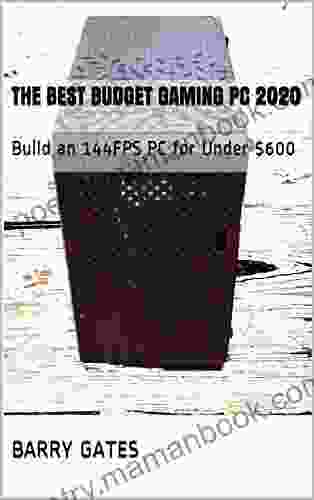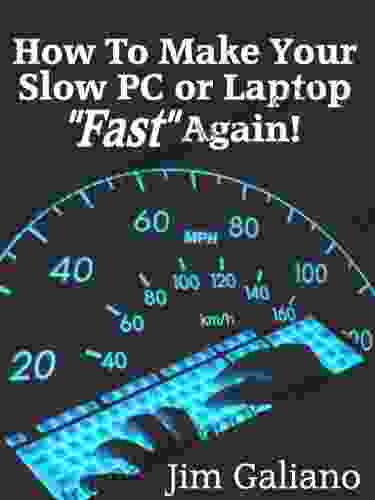How To Make Your Slow PC Or Laptop Fast Again: A Comprehensive Guide


Computers and laptops are essential tools for work, study, and entertainment. However, over time, they can start to slow down, becoming frustrating and inefficient. This can be caused by a variety of factors, including cluttered hard drives, outdated software, and malware.
4 out of 5
| Language | : | English |
| File size | : | 111 KB |
| Text-to-Speech | : | Enabled |
| Screen Reader | : | Supported |
| Enhanced typesetting | : | Enabled |
| Print length | : | 16 pages |
| Lending | : | Enabled |
If you're experiencing a slow computer, don't worry - there are several steps you can take to speed it up again. In this article, we'll provide a comprehensive guide on how to make your slow PC or laptop fast again.
1. Reboot Your Computer
The first step in speeding up your computer is to simply restart it. This will close all running programs and clear the computer's memory, which can help to improve performance. To restart your computer, click on the Start button, then click on the Power button and select Restart.
2. Close Unnecessary Programs
One of the most common causes of a slow computer is having too many programs running at the same time. When you open a program, it uses up some of your computer's memory and processing power. If you have too many programs open, your computer can become overloaded and slow down.
To close unnecessary programs, press the Ctrl + Alt + Delete keys simultaneously. This will open the Task Manager. In the Task Manager, click on the Processes tab and sort the processes by Memory Usage. This will show you which programs are using the most memory.
Right-click on any unnecessary programs and select End Task. This will close the programs and free up some of your computer's memory.
3. Uninstall Unnecessary Software
Another way to speed up your computer is to uninstall any unnecessary software. Software that you don't use can take up space on your hard drive and slow down your computer.
To uninstall software, go to the Control Panel and click on Programs and Features. In the Programs and Features window, select the software that you want to uninstall and click on the Uninstall button.
4. Clean Up Your Hard Drive
A cluttered hard drive can also slow down your computer. When your hard drive is full, it has to work harder to find the files that you need, which can lead to slower performance.
To clean up your hard drive, delete any unnecessary files. You can also use a disk cleanup tool to remove temporary files and other unnecessary data.
To run the disk cleanup tool, go to the Start menu and type "disk cleanup" into the search bar. Click on the Disk Cleanup icon and select the drive that you want to clean up. The Disk Cleanup tool will scan your drive and remove any unnecessary files.
5. Defragment Your Hard Drive
Defragmenting your hard drive can also help to improve performance. When you save files to your hard drive, they are not always stored in contiguous blocks. This can make it difficult for your computer to find the files that it needs, which can lead to slower performance.
Defragmenting your hard drive will rearrange the files on your drive so that they are stored in contiguous blocks. This will make it easier for your computer to find the files that it needs, which can lead to improved performance.
To defragment your hard drive, go to the Start menu and type "defragment" into the search bar. Click on the Defragment and Optimize Drives icon. In the Defragment and Optimize Drives window, select the drive that you want to defragment and click on the Optimize button.
6. Update Your Software
Outdated software can also slow down your computer. Software updates often include performance improvements, so it's important to keep your software up to date.
To update your software, go to the manufacturer's website and download the latest updates. Once you have downloaded the updates, install them on your computer.
7. Scan for Malware
Malware is a type of software that can damage your computer or steal your personal information. Malware can also slow down your computer by using up its resources.
To scan for malware, use a reputable anti-malware program. There are many different anti-malware programs available, so you can choose one that fits your needs.
Once you have installed an anti-malware program, scan your computer for malware. The anti-malware program will remove any malware that it finds.
8. Upgrade Your Hardware
If you've tried all of the above steps and your computer is still slow, you may need to upgrade your hardware. Upgrading your hardware can give your computer a significant performance boost.
There are a few different hardware components that you can upgrade, including:
* Processor: The processor is the brain of your computer. A faster processor will make your computer faster. * RAM: RAM is the memory that your computer uses to store data. More RAM will allow your computer to run more programs at the same time. * Hard drive: The hard drive is where your computer stores your data. A faster hard drive will make it faster to access your data. * Graphics card: The graphics card is responsible for rendering images on your screen. A better graphics card will improve the performance of games and other graphics-intensive applications.
Upgrading your hardware can be expensive, so it's important to weigh the cost against the benefits. If you're not sure whether or not you need to upgrade your hardware, you can consult with a computer technician.
By following the steps in this article, you can speed up your slow PC or laptop and improve its performance. If you're still experiencing problems,
4 out of 5
| Language | : | English |
| File size | : | 111 KB |
| Text-to-Speech | : | Enabled |
| Screen Reader | : | Supported |
| Enhanced typesetting | : | Enabled |
| Print length | : | 16 pages |
| Lending | : | Enabled |
Do you want to contribute by writing guest posts on this blog?
Please contact us and send us a resume of previous articles that you have written.
 Top Book
Top Book Novel
Novel Fiction
Fiction Nonfiction
Nonfiction Literature
Literature Paperback
Paperback Hardcover
Hardcover E-book
E-book Audiobook
Audiobook Bestseller
Bestseller Classic
Classic Mystery
Mystery Thriller
Thriller Romance
Romance Fantasy
Fantasy Science Fiction
Science Fiction Biography
Biography Memoir
Memoir Autobiography
Autobiography Poetry
Poetry Drama
Drama Historical Fiction
Historical Fiction Self-help
Self-help Young Adult
Young Adult Childrens Books
Childrens Books Graphic Novel
Graphic Novel Anthology
Anthology Series
Series Encyclopedia
Encyclopedia Reference
Reference Guidebook
Guidebook Textbook
Textbook Workbook
Workbook Journal
Journal Diary
Diary Manuscript
Manuscript Folio
Folio Pulp Fiction
Pulp Fiction Short Stories
Short Stories Fairy Tales
Fairy Tales Fables
Fables Mythology
Mythology Philosophy
Philosophy Religion
Religion Spirituality
Spirituality Essays
Essays Critique
Critique Commentary
Commentary Glossary
Glossary Bibliography
Bibliography Index
Index Table of Contents
Table of Contents Preface
Preface Introduction
Introduction Foreword
Foreword Afterword
Afterword Appendices
Appendices Annotations
Annotations Footnotes
Footnotes Epilogue
Epilogue Prologue
Prologue Sam Koppelman
Sam Koppelman Randall L B Mcneill
Randall L B Mcneill Richard H Ackerman
Richard H Ackerman Ina Ramesh
Ina Ramesh Bruce Bond
Bruce Bond Azar Nafisi
Azar Nafisi C P Gause
C P Gause Joey Diovisalvi
Joey Diovisalvi Mitra Politi
Mitra Politi Rosie A Point
Rosie A Point Michelle Anderson
Michelle Anderson Graham Ison
Graham Ison Charles M Blow
Charles M Blow Mariama Williams
Mariama Williams Barrington Moore
Barrington Moore Margaret Drabble
Margaret Drabble Bernadette Banner
Bernadette Banner Melinda Metz
Melinda Metz N T Franklin
N T Franklin Bob Tarte
Bob Tarte
Light bulbAdvertise smarter! Our strategic ad space ensures maximum exposure. Reserve your spot today!

 Ralph EllisonAn Illustrated Guide to the Wonders of Form and Function: From Bones to Beak
Ralph EllisonAn Illustrated Guide to the Wonders of Form and Function: From Bones to Beak
 Percy Bysshe ShelleyObsessing Rufina Gil Lefebvre: A Deeper Dive into the Enchanting Portals of...
Percy Bysshe ShelleyObsessing Rufina Gil Lefebvre: A Deeper Dive into the Enchanting Portals of... Kelly BlairFollow ·3.9k
Kelly BlairFollow ·3.9k Junichiro TanizakiFollow ·16.5k
Junichiro TanizakiFollow ·16.5k Louis HayesFollow ·2.4k
Louis HayesFollow ·2.4k Davion PowellFollow ·3.9k
Davion PowellFollow ·3.9k Nick TurnerFollow ·4.9k
Nick TurnerFollow ·4.9k Jeremy MitchellFollow ·18.6k
Jeremy MitchellFollow ·18.6k Jayden CoxFollow ·16.8k
Jayden CoxFollow ·16.8k Dashawn HayesFollow ·11.1k
Dashawn HayesFollow ·11.1k

 Patrick Hayes
Patrick HayesDeath on Stage: Euphemia Martins Mystery 16
Synopsis In the...

 Benji Powell
Benji Powell1001 Best Baking Recipes Of All Time
Baking is a fun and...

 Terry Bell
Terry BellDestined War of the Covens: A Supernatural Saga of Power,...
Welcome to the...

 Mark Twain
Mark TwainBitcoin For Mere Mortals: A Comprehensive Guide for...
Bitcoin is a...

 Dennis Hayes
Dennis HayesThe Best Budget Gaming PC 2024: Build the Ultimate Gaming...
Are you looking to build the best budget...
4 out of 5
| Language | : | English |
| File size | : | 111 KB |
| Text-to-Speech | : | Enabled |
| Screen Reader | : | Supported |
| Enhanced typesetting | : | Enabled |
| Print length | : | 16 pages |
| Lending | : | Enabled |










